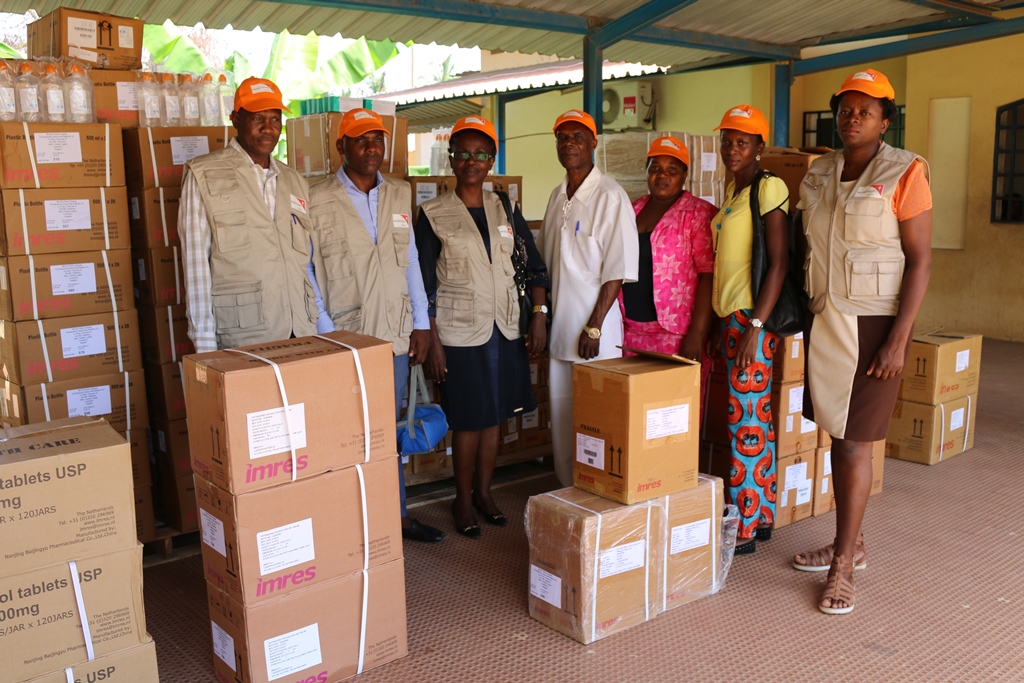World Vision delivers medicines and supplies worth USD200,000 in Angola
After a yellow fever emergency last year, World Vision supported 11 hospitals and provincial health centers in Angola. This week, as requested by the health officials, World Vision delivered urgently needed medicines and medical supplies worth US$200,000. These included mosquito nets, malaria test kits, anti-malarial drugs, antibiotics.
The hospital has 2000 HIV+ patients, 450 of whom are children that contracted the diseases directly from their mothers. Recently, the staff were grateful that anti-retroviral drugs arrived and medicines prescribed to patients. Dr. Ana Paula, a doctor in the hospital for 22 years, explained that the supply is not enough and that monthly needs are not usually met. Pregnant women are not able to get the level of service outlined in national HIV/AIDS policies because the combined medicines recommended during pregnancy are too expensive.
As Dr. Ana took World Vision around the hospital. She showed the wards where some the sick children are sleeping and the laboratory running out of reagent and basic supplies. She said the delivery rooms and anti-natal services are where the girls as young as 10-13 years old come to have their first baby and become young mothers.
Dr. Ana expressed her gratitude for the supplies and equipment coming from World Vision. She said these are critical and much needed through the Christmas period especially as the onset of the rainy season brings more mosquitos and rising malaria cases. With the volume of patients, she predicts the supplies will last only until February 2017 by which time she hopes additional resources will come.
Photo: Before the delivery of medical support, Dr. Ana looks fornlornly at the empty hospital shelves.
The pediatric hospital where Dr. Ana serves is located in Viana, Luanda the municipality where the recent yellow fever outbreak happened. The hospital has 30 beds, three medical staff and an army of administrators and volunteers. It receives around 500 patients a day and provides outpatient services for easily resolved cases, inpatient services for complicated illnesses, nutrition clinics, pre-natal and post-natal services, general practice consultations, vaccinations and laboratory services for a large, poor, urban community in Angola.
Dr. Ana has worked at the hospital since its inauguration 22 years ago. When asked how this past year compared to previous years she quickly told us that this year has been one of the most difficult she can remember. The yellow fever outbreak was difficult and came at a spike in malaria cases brought about because of heavy rains after the El Nino phenomenon. She added, the hardest thing was the lack of medicines. The drop in oil price and subsequent loss of Government revenue, coupled with tight controls on foreign exchange meant that the hospital was not able to maintain even the most basic medical supplies or stocks through the year.
Dr. Ana explains that 50% of patients test positive with severe, life threatening malaria and the hospital do not have the resources to respond for treatment. A quick look in the hospital pharmacy reveals four empty shelves that should be stocked with for the anti-malarial drug CoArtem. There was nothing.
Everyday 15-20 children are being brought with suspected malnutrition, 5-10% of whom have severe acute malnutrition and a further 10-20% will be moderately malnourished, yet the hospital is not able to do anything. They have no therapeutic food and no F75, F100 fortified milk. When they have supplies, more people come but now people know there is no point, but still 15-20 mothers come worried about their children.
World Vision National Director Grenville Hopkinson said, “People like Dr Ana are the unsung heroes of Angola. She works tirelessly to keep the hospital running despite critical shortages. World Vision is privileged to provide this short-term support to ensure services continue through Christmas and the start of the next rainy season. We are partnering with the Ministry of Health to address stock outs longer term but in light of the current economic crisis and forecast spike in mosquito-born diseases these emergency medical procurements are vital.”


